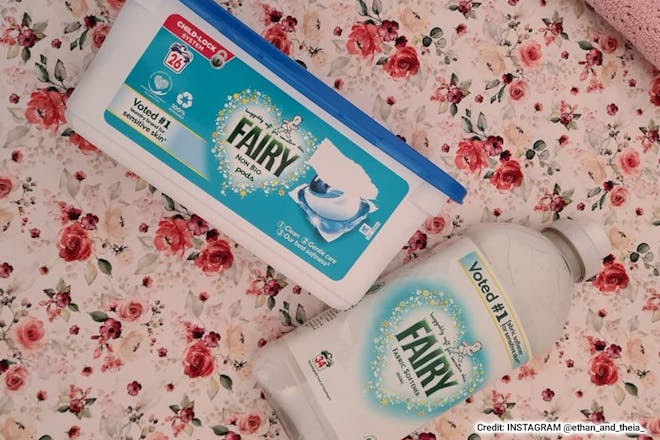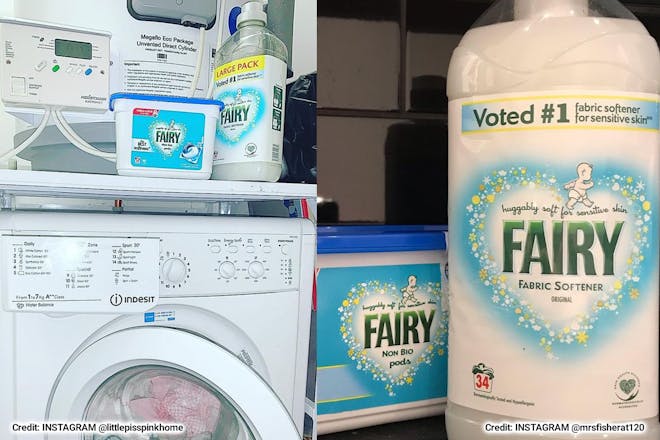How to get relief from itching during pregnancy
Advertisement Promotion
Pregnancy is full of surprises, and one of them is itchy skin. Who knew?!
Yep, alongside random cravings, bigger feet and nausea, another unexpected pregnancy side effect can be itchiness. Aagh.
While it’s fairly common, the NHS recommends letting your midwife or doctor know if you are experiencing itching - even if it's mild - so they can decide whether you need to have any further investigations. In some cases it could be a sign of a more serious condition that needs medical treatment.
However, once your midwife or GP has eliminated any serious cause, these simple steps can help you get relief from itching during pregnancy. Plus, we’ve rounded up some top tips from our Netmums on how they relieved their itchy sensations too.
FREE NEWBORN NAPPIES
1. Switch to washing detergent for sensitive skin
Your skin needs a little extra TLC in pregnancy. And one easy way to stop any itchiness is by using non-bio or sensitive washing powders and detergents such as Fairy Non Bio.
Step forward Fairy Non Bio Sensitive Skin Dream Team – Fairy Non Bio PODS ® and Fairy Fabric Softener . The whole Fairy Non Bio range has been voted the number one laundry brand for sensitive skin.*
Pop a Pod in your washing machine for a gentle clean. Add a slosh of fabric conditioner to leave your clothes soft and comfy against your skin.
And if you're already thinking about how to wash your baby's clothes , and whether you need to wash newborn clothes before use, Fairy Non Bio is perfect. The Pods contain gentle ingredients and mild perfume that are not only ideal for your skin in pregnancy, they'll also leave your newborn's outfits huggably soft.
*Online panel of 3,433 women among which Fairy Non Bio detergent/softener was voted most often as the #1 detergent & fabric softener for sensitive skin.
2. Avoid hot baths and showers
It's best to avoid overly hot water anyway while you're pregnant, as raising your body temperature isn't good for your baby. As a rule of thumb, if your skin turns bright pink, the water's probably too hot.
To relieve itching in pregnancy, you could try taking a cool bath or shower to soothe your skin.
3. Use gentle body lotions and washes
When you're itchy it's tempting to slather on as much body butter or oil as you can. And while this can really help, using a product that is heavily scented could irritate your skin even more. Stick to fragrance-free body lotions and creams, and gently massage in to relieve any itchiness.
You could also try a belly mask – a bit like a face mask but for your pregnant belly – which is said to soothe itching in pregnancy as well as helping to prevent stretch marks.
According to Healthline , you could also try dabbing on a bit of calamine lotion, or even a yoghurt skin treatment!
4. Wear the right clothes
Your maternity clothes are nice and stretchy, giving you lots of room for your growing bump. But you may have noticed that some of your new outfits seem to make your skin even itchier. This is usually the case if they’re made from a synthetic material.
Look for clothes made from natural fabrics like cotton which will let your skin breathe and stop any itchy sensations. Choose loose-fitting pieces, too; that way, they're less likely to rub and irritate your skin.
5. Keep cool
As well as taking a cool bath or shower and wearing loose clothes, you may also find that it helps to sit in front of a fan, or use ice packs on any particularly itchy areas (just be sure to wrap the ice pack in a tea towel or similar first, so it doesn't burn your skin).
6. Avoid spicy food, alcohol and caffeine
According to the charity Tommy's , some women may find that eating or drinking certain things makes the itching worse. If your itching is driving you mad, it may be worth keeping a food diary to see if you can spot any links.
Of course, it's best to avoid alcohol completely while you're pregnant anyway, and to limit caffeine to no more than 200mg a day (about two mugs of coffee).
7. Stay well hydrated
Dry skin can mean itchy skin, so be sure to drink plenty of water throughout the day to keep yourself well hydrated. Experts recommend getting at least 6-8 glasses of fluids , of 1.6 litres, every day. Water's the best bet, but fruit juice and lower-fat milk make great options, too.
Here’s what our Netmums say ...
‘My NCT teacher suggested bathing with porridge oats. Sounds odd but does give relief! You basically put a handful of porridge oats into the foot of an old pair of tights … and throw it into your bath water. It releases a milky substance which can relieve itching - the tights can also be rubbed gently over any really itchy bits.’
‘It started under my boobs and would itch at night. It spread down my tummy and under my arms and was an awful rash! ... In the end I would cake myself in nappy cream lol. It did go away at around 4 months and never came back.’
‘I get itchy skin when pregnant … I had to cut out lots of nice smelling bath stuff etc and only use E45/Oilatum type products. I think pregnancy just made my eczema flare up a bit.’
‘I've been living in cotton PJ's when not at work as I'm finding anything round my tummy really uncomfortable at the mo! Unfortunately my uniform at work has polyester in it (I'm a nurse) and this makes the itching so much worse!! ‘
‘I just kept my skin as hydrated as possible. I used baby oil after the shower and would slather on Palmer's Cocoa Butter or any available moisturiser at every opportunity. It eventually went away.’
Looking for more advice for pregnancy AND when your baby arrives? Check out these articles below, or chat to other parents in our Netmums forum.
Don't forget
Although many women experience some mild, harmless itching during pregnancy, severe itching can be a sign of a more serious health condition, which may need urgent treatment. This could be Intrahepatic cholestasis of pregnancy (ICP, formerly known as Obstetric Cholestasis (OC)), or polymorphic eruption of pregnancy (PEP). You can learn more about these itching-related pregnancy conditions here .
If you experience very severe itching – especially on your hands and feet, and particularly if it gets worse at night – or if you develop a rash of any kind, always speak to your midwife or another medical professional straight away.
Even if your itching is only mild, it's always worth mentioning it to your midwife to be on the safe side.
Related stories
What's the best detergent for a baby with sensitive skin?






